Live on the homepage now!
Reader Supported News
Paranoia following the drone attacks on the Kremlin and a weakened military dog the event Putin views as deeply symbolic
The dramatic footage early last Wednesday of two drones flying over the walls of the Kremlin, its historical seat of power, exposed vulnerabilities in the heart of the Russian capital, putting Moscow on edge.
The authorities have banned the use of drones and started jamming GPS signals, leading to taxis appearing to be in the Moscow River on ride-hailing apps. Binoculars have hastily been handed out to police to spot incoming drones.
“There is a nervousness that I have never seen before,” said one official at the Moscow mayor’s office. “But Victory Day has to go ahead, there is no other option,” he added, speaking on conditions of anonymity.
Tellingly, on Friday, Putin took the unusual step to discuss the preparations for the 9 May Victory Day parade in a meeting with his security council, composed of Russia’s top state officials and heads of defence and security agencies.
Even before the drone attack on the Kremlin, there were signs of unease among the Russian leadership over the celebrations amid fears of Ukrainian strikes.
At least six Russian regions had scrapped the celebrations, with one region 400 miles from the border being the latest to cancel.
Victory Day, when Russians celebrate the 1945 endpoint of what they call the “great patriotic war”, has gradually emerged as the centrepiece of Vladimir Putin’s vision of Russian identity over his 23 years in charge.
The carefully orchestrated victory parades that take place across the country traditionally present the Kremlin with an opportunity to flaunt modern Russian military might.
“For Putin, it is by far the most important event of the year,” said Andrei Kolesnikov, a senior fellow at the Carnegie Endowment for International Peace, based in Moscow.
“Putin derives his whole legitimacy from the parade, framing himself as the direct successor of the army that defeated Nazi Germany.”
Given this importance to the Kremlin, the parade in Moscow will go ahead, Kolesnikov said.
“This is also Putin’s chance to show to the nation that he is still strong and in control of the so-called special military operation in Ukraine,” Kolesnikov added.
But on the eve of 9 May, Russia looks far from triumphing in a war it initially expected to last a few weeks.
Moscow’s winter and spring offensive across a 160-mile arc in eastern Ukraine, which started in February, has brought the country minimal gains at staggering costs.
Western officials have estimated that more than 20,000 Russian soldiers have been killed in fighting in Ukraine since December alone.
Ukraine, backed by modern western weapons, will soon launch its own much anticipated counteroffensive to recapture lost territory.
To add to the worries in the Kremlin, mercenary leader Yevgeny Prigozhin on Thursday recorded a remarkable expletive-ridden video personally blaming the top defence chiefs for losses suffered by fighters in Ukraine. In a separate message, Prigozhin also said his Wagner troops will leave the besieged eastern Ukrainian city of Bakhmut on 10 May, the day after the Victory Parade takes place.
In the cities where the parades will go ahead, experts say a close read of the celebrations is likely to show the strain and damage the war has afflicted on the military.
“Most of the military parades will only have conscripts marching because all the contract soldiers are in Ukraine,” said Dara Massicot, a senior policy researcher at the Rand Corporation.
“With so much of the ground forces engaged in Ukraine, some regions will be forced to get creative and have military instructors and other personnel play a more prominent role to give the appearance of normality,” Massicot added.
One of 9 May’s most recognisable events, the Immortal Regiment march – a solemn procession of people with portraits of their second world war veteran relatives – has also been scrapped this year.
One explanation for such a move, Massicot said, is that the authorities worry the procession could end up highlighting the real number of Russian losses in Ukraine, with relatives bringing the portraits of those killed in the current war.
Kolesnikov said that on Tuesday, Putin is likely to draw historical parallels between the two wars, falsely framing Ukraine as a successor to Nazi Germany.
During last year’s Victory Parade speech, he claimed the Russian army was fighting in Ukraine “so that there is no place in the world for butchers, murderers and Nazis”.
“Victory will be ours, like in 1945,” Putin proclaimed at the time.
A museum in central Moscow dedicated to the second world war has since opened an immersive exhibition that portrays the war in Ukraine alongside the victory over Nazi Germany.
But despite the Kremlin’s efforts to frame the war as an existential battle for the country’s survival, there are signs that some in the country remain unwilling to sacrifice their own wellbeing for what the Kremlin claims to be the greater cause.
According to the latest survey by the independent Levada pollster,most Russians are unwilling to contribute 1,000-2,000 rubles per month (£10-£20) to help the needs of soldiers in Ukraine.
The same poll showed that “anxiety” and “fear” were emotions most often listed when respondents were asked about the new electronic conscription law that makes it harder for young men to dodge the draft by automatically banning registered conscripts from leaving the country.
“The nation has adapted to the realities of the war,” Kolesnikov said.
“But that does not mean people are willing to sacrifice everything. If there is an opportunity to stay on the sidelines, they will happily take it.”
READ MORE  Smoke billows after an Israeli airstrike on Gaza City. (photo: Mahmud Hams/AFP)
Smoke billows after an Israeli airstrike on Gaza City. (photo: Mahmud Hams/AFP)
The Palestinian Islamic Jihad group says three of its leaders killed as well as their wives and some children.
Al Jazeera’s Youmna El Sayed, reporting from Gaza, said the Ministry of Health declared on Tuesday that at least 20 others were injured in the pre-dawn strikes in which more than 40 Israeli warplanes carried out attacks for nearly two hours starting at 2am on Tuesday (23:00 GMT Monday).
Explosions targeting residential apartments were heard in different parts of Gaza, El Sayed said, adding that most of the civilian victims were family members of the PIJ commanders. She said civilians around the apartments were also targeted.
PIJ said three of its commanders were killed in the air attacks and pledged to “avenge” the deaths. The deceased were identified as Jihad al-Ghannam, Khalil al-Bahtini, and Tariq Izz al-Deen.
The three were killed along with their wives and several children, the group said in a statement which did not give details on the number of women and children killed or their ages.
Witnesses said an explosion hit the top floor of an apartment building in Gaza City and a house in the southern city of Rafah, the Reuters news agency reported.
The Israeli army said the air attacks, codenamed “Operation Shield and Arrow”, targeted three PIJ members who it claimed were responsible for recent rockets fired towards Israel.
Hamas chief Ismail Haniyeh said in a statement that “assassinating the leadership in a treacherous operation will not bring security to the occupier, but instead greater resistance”.
The Gaza-based group’s spokesman, Hazem Qassem, warned that Israel “bears responsibility for the repercussions of this escalation”.
Meanwhile, the Palestinian Red Crescent Society said on Tuesday its medics treated 145 injuries in Nablus after an Israeli raid in the occupied West Bank town. A dozen people were shot with live fire and many others suffered tear gas inhalation, according to the Red Crescent Society.
Last week, Israeli missiles pounded the densely-populated Gaza Strip following rockets fired towards Israeli territory in the aftermath of the death in an Israeli prison of well-known Palestinian hunger striker Khader Adnan.
Adnan, an activist affiliated with the PIJ, died after nearly three months on hunger strike. Protesting against his arrest without charge, Adnan had refused to eat for 87 days, according to the Palestinian Prisoner’s Society.
The Israeli bombardment last week damaged multiple areas in Gaza, including al-Safina, al-Baydar and near al-Zaytoun neighbourhood, Al Jazeera’s Maram Humaid reported.
Hashel Mubarak al-Swerki, a 58-year-old father of 11, died after being severely injured by shrapnel from the Israeli attack northwest of Gaza City. Five other people were also wounded by Israeli missiles east of Beit Hanoun, in the north of the besieged strip.
Calm was restored after Qatari, Egyptian and United Nations officials intervened to broker a ceasefire agreement between Israel and armed Palestinian factions, officials said.
In anticipation of Palestinian rockets being launched in response to the air attacks on Tuesday, Israel’s military issued instructions advising Israeli residents of communities within 40km (25 miles) of Gaza to stay close to designated bomb shelters, The Associated Press news agency reported.
COGAT, a unit in the Israeli defence ministry that coordinates civilian affairs with Palestinian authorities, said two crossings with Gaza have been closed for entry and exit of people and goods until further notice, Reuters reported.
READ MORE 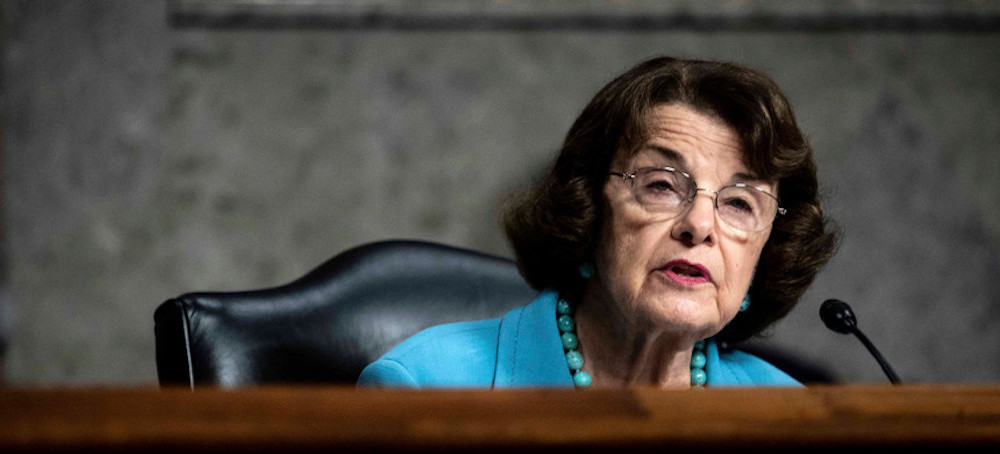 Sen. Dianne Feinstein. (photo: Getty Images)
Sen. Dianne Feinstein. (photo: Getty Images)
The Senate Judiciary Committee chair’s CNN interview suggested patience is beginning to run short amid calls for Sen. Dianne Feinstein (D-Calif.) to resign
But if you look closely at Durbin’s comments this weekend, you begin to see him applying some pressure.
The big headlines from Durbin’s CNN interview tended to focus on host Jake Tapper’s line of questioning. “I mean, all due respect, sir, you and your fellow Democrats were very ginger and very polite when it came to Justice Ruth Bader Ginsburg in not pushing her to retire when you had a Democratic majority in the Senate,” Tapper said. “How did that work out for you? How did that work out for Roe v. Wade?”
That’s an eminently fair point, which we dissected here. Feinstein’s defenders can note that it’s rare to apply pressure on an ailing senator to resign, but the stakes here are also rare. Democrats’ majority and time to confirm judges could be running short, and Feinstein’s absence — she was hospitalized in March for shingles — means Republicans can block them.
But while Durbin offered general and sympathetic comments about how this is up to Feinstein, 89, he also undercut her defense for holding out. And he even seemed to question her pledge that she would be back.
In a statement last week, Feinstein maintained that despite her absence on the Judiciary Committee, “There has been no slowdown.”
Durbin seemed to take issue with this, albeit without directly addressing it. He pointed to Democrats’ inability to subpoena people to probe reports on Supreme Court Justice Clarence Thomas, such as Leonard Leo and Harlan Crow, if they decided they wanted to.
“We need her,” he said. “It is a challenge in the Senate Judiciary Committee to do our business.”
Durbin later repeated this, while alluding to the fact that this situation is different than other senators who have been absent for long stretches because of illness.
“I don’t want to say that she’s going to be put under more pressure than others have been in the past,” he said. “But the bottom line is: The business of the committee and of the Senate is affected by her absence.”
In addition, Feinstein’s statement last week treated her return as inevitable — i.e., she said “when I return to the Senate” — but Durbin notably intimated it was possible that she wouldn’t.
“I hope she does what’s best for her and her family and the state of California and makes a decision soon as to whether she’s coming back,” he said.
Durbin’s commentary is clearly less favorable to Feinstein than some of her most ardent defenders.
Some like Rep. Nancy Pelosi (D-Calif.) and Sen. Chris Murphy (D-Conn.) have suggested the calls for her to resign are sexist. Others like Sen. Sheldon Whitehouse (D-R.I.) and Rep. Adam B. Schiff (D-Calif.), who is running to replace Feinstein, have suggested it might be pointless — because Republicans might not seat a replacement on the committee.
(The GOP has blocked a temporary replacement for Feinstein, but not replacing a resigned senator and depriving the majority party of a majority on the committee would set a remarkable new precedent. Sen. Lindsey O. Graham (S.C.), the committee’s senior Republican, has assured he would support replacing Feinstein in that situation.)
Durbin’s comments, importantly, indicate even top Democrats don’t appear to have clarity on when Feinstein might be able to return. The photographed notes of Senate Majority Leader Charles E. Schumer (D-N.Y.) last week indicated he was “hopeful” she would come back this week, but Feinstein’s office said there was no timeline for her return.
Questions about Feinstein’s ability to serve have lingered for years, which also colors the situation. The New York Times editorial board on Friday argued that it was just about decision time.
“If she cannot fulfill her obligations to the Senate and to her constituents, she should resign and turn over her responsibilities to an appointed successor,” it said. “If she is unable to reach that decision on her own, Mr. Schumer, the majority leader, and other Democratic senators should make it clear to her and the public how important it is that she do so.”
Durbin’s comments move the ball forward on that — subtly, of course.
READ MORE 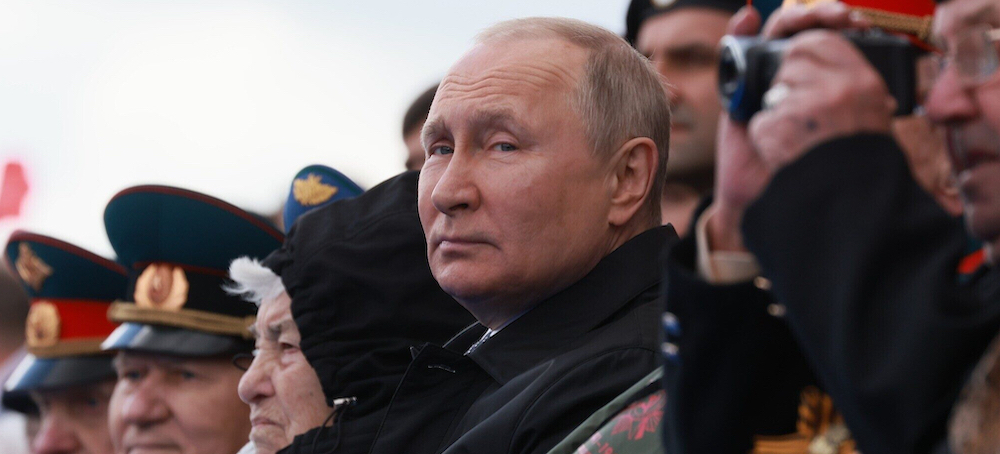 Russian president Vladimir Putin. (photo: Mikhail Metzel/Sputnik/AP)
Russian president Vladimir Putin. (photo: Mikhail Metzel/Sputnik/AP)
Putin once saw advantage in giving writers a degree of freedom, even to be critical. Those days are long gone, and Russia’s artists are fleeing
In the years of the Soviet Union, speaking one’s mind might mean being taken to a windowless room and then to Siberia. Today, Russians can – and do – face the same kind of danger for speaking out against Vladimir Putin’s war in Ukraine. In the words of Pyotr Stolypin: “In Russia, every 10 years everything changes, and nothing changes in 200 years.”
In the west, we might think of Russian writers always facing the same kind of censorship they faced under the Soviet Union. We imagine poets being shot in basements or worked to death in the snows of Siberia for a few lines of transgressive verse. But this has broadly not been the case in my lifetime – or at least, until the invasion of Ukraine.
Initially, under Putin, Russian authors were granted a great degree of freedom, even to oppose the state. When he came to power in 1999, he learned from the mistakes of the Soviet Union and had a different relationship with Russia’s literary culture. Far from seeking to exert control over the nation’s writers, Putin’s Kremlin understood their value in political terms. That is, they had a certain utility in the new Russia that Putin wanted to construct for the outside world.
The reason for this softening under Putin was twofold. The first point is that literature was no longer the primary medium consumed in Russia. What was written and published inside the Soviet Union had genuine political power, as did Russian music and film. Stalin was an avid reader and very interested in literature, and the Soviets were deeply involved in the censorship of every kind of Russian culture. The intention of this was to make the population believe the state was reality, and reality was the state.
Putin and the thugs running the Kremlin weren’t nearly so closely attuned to contemporary Russian literary culture as the Soviets. This is for the simple reason that Putin’s Kremlin didn’t care because it didn’t need to. Today, most Russians are primarily influenced by TV and the internet. Putin didn’t care about the novels written in Russia, because literature was no longer where people got their news and ideas.
The second reason for Putin’s historically tolerant stance towards Russia’s writing community was that, when he came to power, he was trying to create a different kind of dictatorship. Rather than controlling every aspect of people’s lives as the Soviets did, Putin wanted to deceive the world – and indeed the Russian people themselves – into thinking that the country was a European democracy.
When questions were asked about the legitimacy of Russia’s democracy, the Kremlin could point to regular, free elections, a free press and a thriving literary culture. It was in fact in Putin’s interest to allow writers – even, and especially, political dissidents – to write freely.
I recently spoke to Mikhail Shishkin, a renowned Russian novelist and dissident now living in Switzerland. During the late 90s and early 2000s, the Russian Federation worked to support and export its writers, Shishkin said. This was an official project of the Federal Agency for Press and Mass Media (Роспечать or Rospechat), and an organisation called Institut Perevoda gave financial support to publishers so Russian books could be translated and read outside the country. The purpose was to create a dignified facade; a human face for what was then a crypto-authoritarian regime. “You have to understand that the new hybrid dictatorship pretended to be a free country, and worked with writers in a different way [to the Soviets],” said Shishkin.
But by 2013, Shishkin had had it. He refused to represent Russia at an international book fair in New York, and wrote an open letter to Rospechat lambasting the political class of his country. He stated that the Russian government had “created a situation in the country that is absolutely unacceptable and demeaning for its people and its great culture”, that he was “ashamed” to be a citizen of Russia.
Of course, everything changed last February. When the tanks rolled across the Ukrainian border, the era of pragmatic tolerance under Putin ended. Rospechat was dissolved in 2021 and its role was absorbed into a different agency: the Federal Service for Supervision of Communications, Information Technology and Mass Media (Roskomnadzor). This is a truly sinister organisation that is responsible for monitoring and policing internet traffic in Russia. A data leak from Roskomnadzor obtained by the Belarusian hacker group known as Cyber Partisans revealed that Roskomnadzor is working to censor undesirable content online in both Russia and in Belarus, as well as compiling a list of individuals who may be designated “foreign agents”.
Arguably, the danger involved in speaking out against Putin is greater now than it has been in the recent past, but so is the need for people to do so. Writers, of all people in society, have a duty to speak the truth, and to choose silence is to commit creative suicide. This is why so many of Russia’s greatest cultural figures live in Europe and the United States: exile provides a level of safety and freedom not possible in Russia.
This situation is deeply paradoxical. Part of Putin’s justification for the invasion of Ukraine was to save the Russian culture and language from a supposed neo-Nazi persecution in Ukraine, but all the war has done is accelerate the flight of the brightest and best from Russian soil. Boris Akunin now writes from London, Lyudmila Ulitskaya from Berlin. The more artists leave, the more homogenous Russia will become culturally, leaving only the pro-Putin types behind. A few notable artists and writers still work under Putin on the Presidential Council for Culture and Art. By being on this council, all these figures are overtly expressing support for the Putin regime and, by extension, the war in Ukraine. Taken to its extreme, Russia risks becoming a cultural Potemkin: immaculate plasterwork on the outside, crumbling masonry within.
Many in the west have suggested a boycott of Russian culture in response to the war. But this tactic plays precisely into Putin’s rhetoric: that the west hates Russia and always has. On the contrary, it is vital that thinking people everywhere support Russian dissidents: by buying their books, going to their concerts and attending their exhibitions. But this said, people must also remember to make the distinction between Russian dissidents and Kremlin royalists. In a sense, the war has split Russia cleanly in two: between those with moral conviction and those without. A war is not just being fought on the steppes of Ukraine, but in the psyche of one of the world’s greatest cultures.
READ MORE 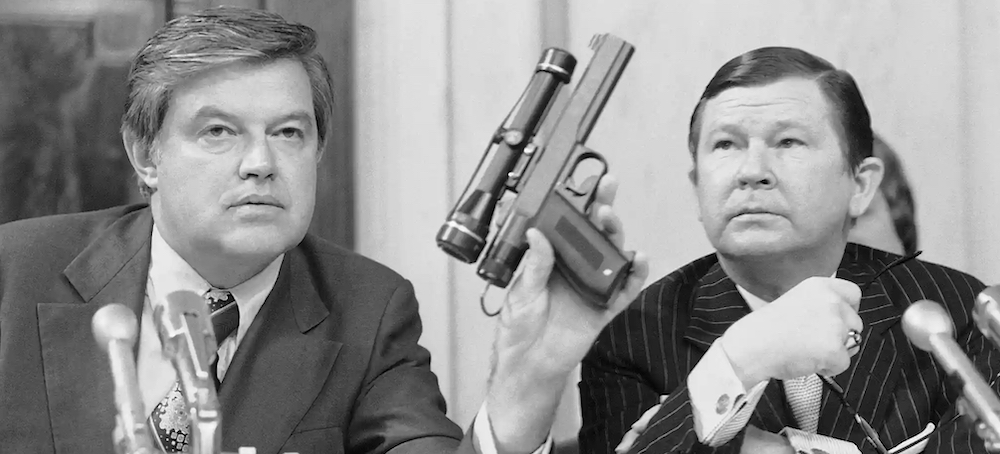 Frank Church holds up a poison dart gun during a Senate intelligence committee hearing about the CIA, in September 1975. (photo: Henry Griffin/AP)
Frank Church holds up a poison dart gun during a Senate intelligence committee hearing about the CIA, in September 1975. (photo: Henry Griffin/AP)
Pulitzer-winner James Risen calls the late Democratic senator an ‘American Cicero’ – and makes a strong case
“For decades … the CIA’s operations faced only glancing scrutiny from the White House, and virtually none from Congress,” Risen writes. “True oversight would have to wait until 1975, and the arrival on the national stage of a senator from Idaho, Frank Church.”
For 16 months, Church and his committee scrutinized the CIA, FBI and National Security Agency and their many abuses. Amid the cold war, in the aftermath of Vietnam and Watergate, Congress grappled with the balance between civil liberties and national security, executive prerogative and congressional authority.
Political assassinations, covert operations and domestic surveillance finally received scrutiny and oversight. A plot to kill Fidel Castro, with an assist from organized crime, made headlines. So did the personal ties that bound John F Kennedy, mob boss Sam Giancana and their shared mistress, Judith Campbell Exner.
Giancana was murdered before he testified. Before John Rosselli, another mobster, could make a third appearance, his decomposed body turned up in a steel fuel drum near Miami.
One subheading in the Church committee’s interim report bears the title: “The Question of Whether the Assassination Operation Involving Underworld Figures Was Known About by Attorney General Kennedy or President Kennedy as Revealed by Investigations of Giancana and Rosselli”.
Against this grizzly but intriguing backdrop, Risen’s book is aptly subtitled: The CIA, the FBI, the Mafia, and the Kennedys – And One Senator’s Fight to Save Democracy. The Last Honest Man is a gem, marbled with scoop, laden with interviews.
In 2006, Risen won the Pulitzer prize for his coverage of George W Bush’s warrantless wiretapping program. Risen was also part of the New York Times team that snagged a Pulitzer in the aftermath of September 11. He endured a seven-year legal battle with the Bush and Obama justice departments, for refusing to name a source. Eric Holder, Barack Obama’s attorney general, backed off. But he earned Risen’s lasting ire.
In 2015, Risen called the Obama administration “the greatest enemy of press freedom in a generation”. Holder, he said, “has done the bidding of the intelligence community and the White House to damage press freedom in the United States”.
And then came Donald Trump.
Risen now describes Dick Cheney’s efforts to block Church’s committee, as chief of staff to Gerald Ford. To Cheney’s consternation, the president “refused to engage in an all-out war”. So Cheney nursed a grudge and bided his time.
In 1987, Cheney and congressional Republicans issued a dissent on Iran-Contra, blaming the Church committee for the concept of “all but unlimited congressional power”. Later, as vice-president to George W Bush, Cheney zestily embraced the theory of the unitary executive, the global “war on terror” and the invasion of Iraq.
The Last Honest Man also doubles as a guide to high-stakes politics. Risen captures Gary Hart and the late Walter Mondale on the record. Both Democratic presidential hopefuls – Mondale the candidate in 1984, Hart the frontrunner, briefly, in the 1988 race – after sitting on Church’s committee. The three senators were competitors and colleagues. Paths and ambitions intersected.
Church entered the 1976 Democratic presidential primary late – and lost to Jimmy Carter. Carter weighed picking Church as his running mate but opted for Mondale instead.
“I think he had seen me on a Sunday news talk show, talking about the Church committee, and he liked how I looked and sounded,” Mondale told Risen.
It was for the best. Church never cottoned to Carter. Carter and his aides returned the favor. They “hated Church right back”. David Aaron, a Church aide and later deputy to Zbigniew Brzezinski, Carter’s national security adviser, recalls: “I know that whenever Church’s name came up, Brzezinski would grimace.”
In 1980, Ronald Reagan and George HW Bush beat Carter and Mondale in a landslide. The election also cost Church his seat and the Democrats control of the Senate. Four years later, Mondale bested Hart for the Democratic nomination, only to be shellacked by Reagan-Bush again.
Daniel Ellsberg, the Pentagon Papers whistleblower, leaves his mark on Risen’s pages too. He played a “previously undisclosed role in the Church committee’s investigation of the assassinations of foreign leaders”, Risen reports in a lengthy footnote.
In an interview, Ellsberg says he “met privately” with Church in 1975, as the committee investigated assassination plots. In Risen’s telling, Ellsberg cops to handing Church “a manilla envelope containing copies of a series of top-secret cables” between the US embassy in South Vietnam and “the Kennedy White House”.
The messages purportedly pertained to the “US role in the planning of the 1963 coup against South Vietnamese president [Ngô Đình] Diệm that resulted in his assassination”. The Church committee interim report referred to cable traffic between the embassy in Saigon and the White House but contained no mention of Ellsberg.
In other words, assassinations and coups carry a bipartisan legacy. It wasn’t just Eisenhower and Nixon, Iran and Chile.
Risen hails Church as “an American Cicero” who “offered the United States a brief glimpse of what it would be like to turn away from its imperialistic ambitions … and return to its roots as a republic”.
He overstates, but not by much. Iraq and its aftermath still reverberate. But for that debacle, it is unlikely Trumpism would have attained the purchase it still possesses. Our national divide would not be as deep – or intractable. Church died in April 1984, aged just 59.
READ MORE 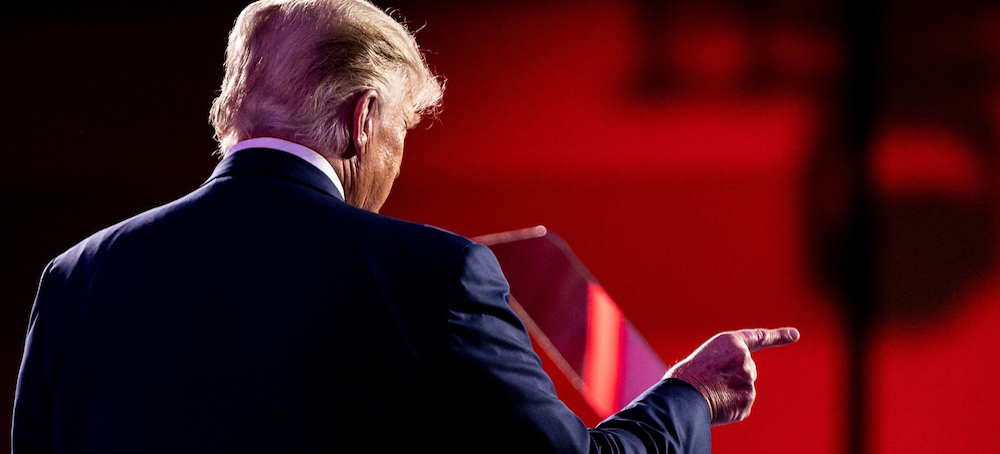 Donald Trump. (photo: Erin Schaff/NYT/Redux)
Donald Trump. (photo: Erin Schaff/NYT/Redux)
E. Jean Carroll's Lawyers Close With Trump's Own Damning Words
Jose Pagliery, The Daily Beast
Pagliery writes: "The most damning witness at Donald Trump's rape trial was the former president himself, E. Jean Carroll's lead lawyer said in her final plea to a New York jury on Monday morning, recapping the former president's long history of self-incriminating and misogynistic statements."
E. Jean Carroll's lawyers closed their lawsuit against Trump by reminding jurors of the very things Trump has said about sexually assaulting women.
“No one, not even the former president, is above the law,” lawyer Roberta Kaplan said in her closing arguments. “In a real sense, Donald Trump is a witness against himself.”
Carroll’s legal team put together a one-hour presentation that showed the ugliest side of the real estate mogul, directly comparing his piggish boasting about his treatment of women to the present case, where nine jurors will decide whether Trump raped the advice columnist in the fitting room of a high-end Manhattan fashion store.
The most damning example came from the leaked 2005 Access Hollywood tape in which Trump was caught bragging about how celebrities like him can abuse their stardom to take advantage of women and “grab ’em by the pussy.” Kaplan compared that to the way he responded under oath during a deposition last year, when Trump told Kaplan that stars have long gotten away with it, “unfortunately—or fortunately.”
“He actually said fortunately?” Kaplan told the jury incredulously. “Let that sink in for a moment… he thinks stars like him can get away with it. And he thinks he can get away with it here,” she said.
“He grabbed her by the pussy—or vagina, excuse my language—and shoved his fingers inside her,” Kaplan later added, looking visibly uncomfortable.
Jurors were once again told that Carroll isn’t the only woman accusing him of sexual misconduct, even though she’s the only one suing. Jurors also heard in-person testimony from Jessica Leeds, a woman who said Trump groped and kissed her on a plane sometime around 1978, and Natasha Stoynoff, who said Trump attacked her at his Florida oceanside estate of Mar-a-Lago while she was on assignment there for People magazine in 2005.
Trump followed “the same playbook” that he described in the Access Hollywood tape, Kaplan told them. “He’s telling you in his very own words how he treats women,” she said.
For years, Trump’s go-to defense in this case has been that Carroll isn’t his “type.” And that made another piece of evidence all the more damning.
Jurors remained expressionless on Monday when Kaplan went over other evidence that made the courtroom crowd gasp earlier in the trial: the moment during Trump’s deposition when he embarrassingly viewed a photo of Carroll next to him at a party and misidentified her as his ex-wife Marla Maples. One of Trump’s lawyers in the case, Alina Habba, could be heard repeatedly interjecting to correct him in a hopeless effort to save her client.
“She was exactly his type. And believe it or not, he repeated it twice,” Kaplan told jurors. “Ms. Carroll, a former cheerleader and Ms. Indiana, was exactly his type.”
The lawyer reminded jurors that Carroll’s seemingly unexpected behavior—keeping the dress she had on during the alleged attack, watching The Apprentice on NBC despite it being Trump’s TV show, and often returning to shop at Bergdorf Goodman—made sense because doing the opposite would have forced her to acknowledge a traumatic experience she was trying to bury in her past for years.
Kaplan also ripped into Trump for skipping the trial, though she didn’t mention that he actually spent the time golfing in Ireland and Scotland while angrily posting on social media about his utter disdain for the case.
“You only saw him on video,” she said. “He didn’t even bother to show up here,”
Carroll’s team reminded jurors that they have two things to decide: if Trump raped the advice columnist when she was 52, and whether or not he defamed her in a Truth Social post last year.
However, in what may be the most surprising moment in her closing argument, Kaplan didn’t even mention how much money her side was asking for in terms of legal damages. Although a marketing expert during the trial guessed that it could cost anywhere from $1 million to $3 million to repair the damage to Carroll’s reputation, Kaplan didn’t even bring it up to the jury, opting instead to remind them that this case isn’t about the money.
When it was the other side's turn to make a final shot at convincing the jury, Trump's lead defense lawyer, Joe Tacopina, started by saying "no one's above the law, but no one's below it either."
He proceeded to deride the case as a "scam of a lawsuit" that "abused this system... for money, status, and political reasons," adopting Trump's go-to ridicule that this is nothing more than a "made up" story meant to harm his political standing.
"With no date, no month, no year, we can't call an alibi or a witness," he told them. "What they want is for you to hate him enough you'll ignore the facts, which make no sense."
Unable to ignore Trump's own damning admissions in the Access Hollywood tape, Tacopina said "it's rude, it's gross... but that doesn't make Ms. Carroll's unbelievable story believable."
Instead, he described the way that Carroll's case largely rested on the way she confided in two women back in 1996. Tacopina asked the jury to consider two scenarios and decide what's more likely: That she entrusted two people she barely knew back then with explicit details they kept secret for decades? Or that three women who eventually became close friends and abhorred Trump's politics hatched a plot together to fake a story about an incident that happened too long ago to disprove?
The crux of that theory relied on an email exchange between Carroll and one of those women, the former New York City local TV journalist Carol Martin, in which they complained about Trump.
"This has to stop. As soon as we're both well enuf to scheme, we must do our patriotic duty again," Martin wrote on Sept. 23, 2017.
"TOTALLY!!! I have something special for you when we meet," Carroll responded, a month before she started working on her tell-all book.
During the trial, Carroll's lawyers repeatedly claimed that was an innocent conversation that had nothing to do with actual scheming. But Tacopina appealed for jurors to use their "common sense."
"Scheme... it's a secret, a nefarious plan," he said, scoffing at the notion that the word would be used in a benign way. "Let's scheme to go to the library. let's scheme to go to the Yankee's game. We don't talk like that... scheme is exactly what you think it means."
In making the case that these three friends simply went along with a lie—one that went too far—Tacopina pointed to the way Martin expressed reservations about Carroll's campaign against Trump in a private text to another friend. Although Carroll's lawyers had previously tried to explain that the message lacked context, Tacopina continued to read it as "lethal" evidence of a conspiratorial plot.
Jurors were shown Martin's 2021 text where she wrote, "It's too hyperbolic. Too much celebratory stuff over something that hasn't really happened. She said she's gonna sue T when adult victims of rape law is passed in new York State or something. WTF."
"What the fuck! We're gonna sue him for rape that hasn't really happened?" Tacopina told the jurors. "They got caught... game, set, and match."
The day came to a close when another attorney on Carroll's team delivered their rebuttal that slammed Trump hard for not even showing up.
"This was never a 'he-said, she-said' case," Michael Ferrara remarked. "This was never even a 'he said,' because he never looked you in the eye and denied it."
READ MORE A road in Miami, Florida. (photo: CBS)
A road in Miami, Florida. (photo: CBS)
Conservation groups are urging DeSantis to veto the bill, saying phosphogypsum would hurt water quality and put road construction crews at a higher risk of cancer.
Here's what to know about the law and about phosphogypsum.
What would the law do, specifically?
HB 1191 would compel the Florida Transportation Department to study using phosphogypsum in paving projects, calling for "demonstration projects using phosphogypsum in road construction aggregate material to determine its feasibility as a paving material."
If it's approved, phosphogypsum would join pavement aggregates such as crushed stone, gravel and sand. In recent years, the Federal Highway Administration says, industrial byproducts and reclaimed materials have also been used as aggregates.
The bill sets a deadline of April 1, 2024, giving the transportation agency less than a year to complete its work and make a recommendation. The Republican-dominated Florida Legislature approved the measure by a wide margin.
What is phosphogypsum and why is there so much of it?
In fertilizer, phosphorus is particularly important for plants to have strong roots and for crops to be productive. Florida has been an important source since the 1800s; today, the EPA notes, "Florida alone accounts for approximately 80 percent of the current capacity, making it the world's largest phosphate producing area."
When phosphate rock is dissolved in sulfuric acid to make phosphoric acid for fertilizer and a few other uses, phosphogypsum is what's left over.
The commonly used production process, which dates to the 1840s, is not very efficient. For every ton of phosphoric acid produced, more than 5 tons of phosphogypsum waste is generated.
Florida's prominent role means the state also has massive waste sites called phosphogypsum stacks, or "gypstacks." Such stacks can be very large — spanning up to 800 acres and about 200 feet in height. They've been linked to serious problems over the years, due to sinkholes and other breaches.
Is it dangerous?
"Phosphogypsum contains appreciable quantities of uranium and its decay products, such as radium-226," according to the EPA. And because the fertilizer production process concentrates waste material, "phosphogypsum is more radioactive than the original phosphate rock," the agency notes.
"The radium is of particular concern because it decays to form radon, a cancer-causing, radioactive gas," the EPA adds.
An analysis commissioned by the Fertilizer Institute, a group that represents the fertilizer industry, disagrees, saying that using phosphogypsum in road construction won't produce radioactive doses that are above the EPA's acceptable risks. Such work, it stated, "can be done safely and results in doses that are a small fraction of those arising from natural background radiation."
Last November, researchers in China who reviewed numerous existing studies on recycling phosphogypsum said they were optimistic about its potential use in road construction materials. But they concluded that more studies are needed, noting that "few studies have focused on its durability or analyzed its long-term effects on soil and water resources."
Critics of the new legislation are urging DeSantis to use his veto power.
"Using radioactive phosphogypsum in roads is not a solution to the fertilizer industry's toxic waste problem," the Center for Biological Diversity and more than 30 other groups said in a letter to the governor. "Florida should not be a test subject in the industry's reckless experiment."
The groups say the fertilizer industry has already shown it can't adequately manage more than 1 billion tons of waste currently stored in Florida.
Is Florida's plan legal?
The EPA states that "phosphogypsum remains prohibited from use in road construction," as it has been almost continuously for more than 30 years.
Under former President Donald Trump, the EPA briefly rescinded that policy starting in October 2020. But it reinstated the rule in June 2021.
The Florida legislation doesn't address the federal prohibition outright, saying that phosphogypsum can be used as an aggregate material "in accordance with the conditions of the United States Environmental Protection Agency approval for the use." Its supporting documents also note that the EPA allows some uses for research purposes — and it asserts that phosphogypsum is not technically a "solid waste."
When contacted by NPR to comment on Florida's plan, the EPA did not immediately supply a statement.
What's next?
DeSantis could sign the phosphogypsum road-test measure into law at any time; it he takes no action, the bill will be enacted automatically.
Follow us on facebook and twitter!
PO Box 2043 / Citrus Heights, CA 95611

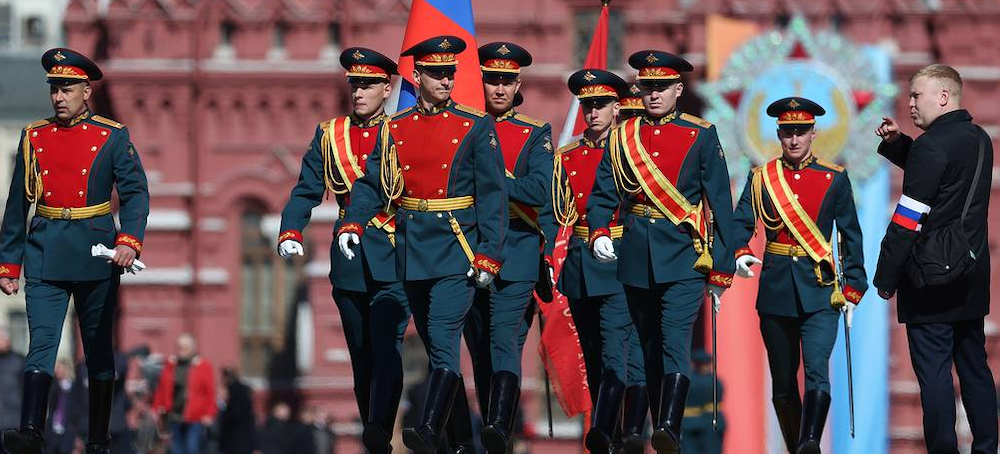

No comments:
Post a Comment
Note: Only a member of this blog may post a comment.